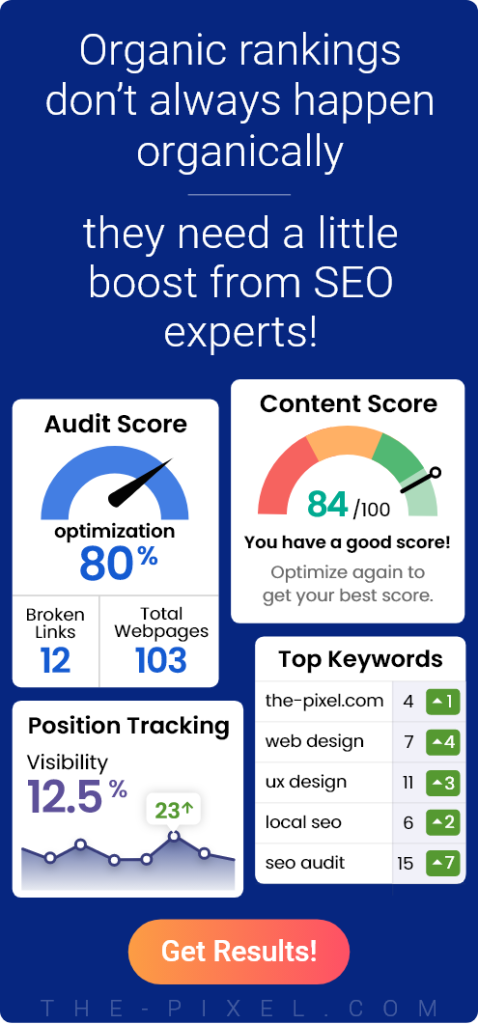Mistakes to Your SEO Strategy
Mistakes to Your SEO Strategy
SEO is Constantly Evolving – is that Good or Bad?
Search engine optimization (SEO) is a constantly evolving subject matter that even the most-seasoned digital marketing professionals struggle to entirely comprehend. While mistakes are at times inevitable, it’s imperative that you are familiar with not only best practices for SEO, but worst practices as well.
Not only are errors in your SEO a huge waste of time and resources, they can also harm your rankings. This is why before you are able to build a successful SEO strategy, you first need to familiarize yourself with poor SEO methods so you know what to avoid.
1. Not optimizing your site for mobile
With so many people reaching for their mobile device to surf the web, it is crucial that your site be responsive and user-friendly upon landing. If you’re not familiar with mobile-friendly web design, it’s the concept of your site being easily accessible when viewing on a mobile device.
For example, here is how a mobile-friendly site ideally should be displayed as:
2. Creating poor quality content
In regards to digital marketing, you may at some point have heard the expression “Content is king.” However, that statement can sometimes be misinterpreted. While it’s true that to this day content is still a vital component of any SEO strategy, that doesn’t necessarily mean that you should throw up a subpar post on your blog every day of the week.
To take advantage of all the benefits that it has to offer, you have to make sure that you are producing quality content that your audience will want to read. This goes for the content all across your site – including the interior pages, blog articles, videos, social media, etc.
Producing content that is authoritative and informative will not only build trust and intrigue your readers, it will also provide Google with more context regarding your website – this will help you rank better on search and therefore receive more traffic.
If you’re looking for ways to improve the quality and effectiveness of your SEO download our free SEO checklist to help you get started.
3. Targeting the wrong keywords
No successful SEO strategy is complete without a list of keywords that you would like to try to rank for – but, do you know if you selected the right keywords for your industry? Before just throwing together a mediocre list, you want to conduct careful research to ensure that you are choosing keywords that will not only drive traffic – but the right traffic.
So, how do you do this? Well, before you can decide which keywords you would like to try to rank for, you will first need to identify who your target audience is and what style of wording it uses when conducting a search.
Once this is determined, you can then turn to a free keyword tool such as Google’s Keyword Planner to scrape the surface – or, a paid tool like Ahrefs, Moz, etc. for further advantages.
Utilize your tool of choice to help you discover keywords relevant to your business and industry, taking note of which ones have the highest search volume and lowest difficulty. After that, you will have to create a keyword map to determine where and when the keywords will be used on the site. Incorporating these keywords in your SEO strategy will help improve your rankings on Google and drive relevant traffic to your site.
4. Neglecting Google’s algorithm changes
If you haven’t noticed, Google is continually changing its guidelines to provide its users with the most relevant search engine results pages (SERPs.) Keeping up with these updates will allow you to stay ahead of the curve and optimize your site with the most up-to-date best practices. Failure to keep up with these algorithm updates can lead to your site falling behind in rankings or even result in penalties.
However, as the technology company tends to release their updates off the radar, keeping up with Google’s changes isn’t as simple as you may think. This is why the only real way to stay on top of the algorithm changes is to pay close attention to your site’s rankings and decipher if any drastic changes have occurred.
If you don’t necessarily have a great eye for stats, or just don’t have enough time to intensely analyze your site’s traffic and rankings on a daily basis – there are some generous SEOs out there that take note of Google’s algorithm updates for the rest of us. Moz and Search Engine Journal are just a couple of the blogs you can turn to for details regarding new Google updates.
5. Not regularly auditing your site
What many people don’t realize is that SEO isn’t a one-and-done deal. Your SEO can be in tip-top shape when you first implement your strategy, but there are certain technical mistakes that can still pop up unexpectedly. This is where a site audit comes into play.
Our free SEO audit report will allow you to identify technical errors that you might have missed just briefly viewing the site in passing.
Utilizing a tool such as Ahrefs, SEMrush, Moz, etc. will point out broken links, missing alt-text, duplicate content, and other factors that could contribute to your site not ranking well.
After you determine what changes should be made, you’ll be able to go ahead and make improvements that will not only appease Google and improve your organic rankings, but also make your site more friendly for users and encourage them to stay and click around.
Clearly, the only way you will always be doing right by your site (and your business) is to stay on top of things. Digital business is an ever-evolving process that creates challenges and opportunities for everyone. How we address these obstacles is up to you and your team – but, seriously, the resources I’ve shared above will be a major help.
Hire ThePixel to build your next website!
Since our founding in 2008, we’ve created and launched many types of business websites. Over the last decade and we’ve learned a thing or two! That’s why we’re masters of our craft, let us help you build the website of your dreams – one that generates traffic, leads and conversions.
Are you ready to start? If yes, contact ThePixel and one of our representatives will guide you through the website phases and how the process works either by a Zoom Meeting or phone.
![]()

